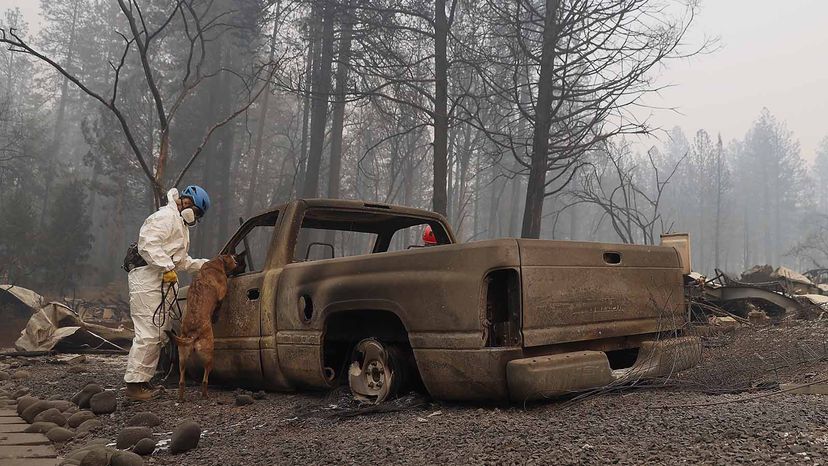SAR Dogs at Work

SAR teams are on call 24 hours a day, seven days a week, 365 days a year. Dogs often accompany their handlers to work and on vacation in case a call comes in from law-enforcement authorities. Typically, a police unit alerts a SAR organization to a case, and the SAR organization then alerts its team members. The case might be a missing child, a group of hikers who never arrived at their camp site, a collapsed building, an earthquake, an escaped convict or a new tip in a crime that places a victim's body in a particular lake.
Once alerted to a call-out, the dog/handler team loads up its equipment, which may include severe-weather gear, ropes and harnesses, radios, compasses, maps, food, water and other items that come in handy on a search. If the call-out is for an avalanche search, transportation might involve a helicopter. If it's a wilderness search, the team usually drives to the base location and then hikes or rappels to the area. If the search is for a drowning victim, the handler and dog arrive by boat.
Advertisement
Once at the scene, the dog's obedience is fully tested. Distractions are everywhere — people and dogs searching, reporters, flood lights, bullhorns. The SAR unit leader is in charge, reporting to the head law-enforcement authority or search authority at the scene. At a large search, a SAR group may set up a base camp complete with radio communications, rest areas and search advisers. The SAR leader gives each dog/handler team a location to clear. If the dog shows interest in a particular spot but does not do a full alert, the handler notes the location. If the dog gives a full alert, everyone mobilizes.
In a water search, divers hit the water; in an avalanche search, every available searcher digs in the snow; in a wilderness search, people might work to pry rocks out of the way of a cave opening to hunt for a possible missing hiker. While all of this is occurring, the dog and his handler may be off to the side playing tug-of-war (or whatever the dog's reward of choice is) so the dog knows he won the game.
Even if the missing person turns out to be deceased, the handler will discreetly play with the dog. As long as search-and-rescue remains a game, the dog will happily do his job until his handler decides it's time for retirement.
Yes, SAR dogs do retire, typically, they can no longer handle the physical rigors of the work — usually when they're 8 to 10 years old. Urban disaster work is hard on both the dogs and handlers.
When a SAR dog retires, he usually lives out his retirement with his handler. If his handler can't take care of him any longer, there are organizations that will find new adoptive homes for retired search dogs. In either case, the dog enjoys a life of fun, games and leisure, a much-deserved reward for a career of fun, games and public service.
For more information on search and rescue, check out the links below.
Related Articles
More Great Links
Sources
- "The Art of Heroism." http://www.petfinder.com/journalindex.cgi?path=/public/petsandthecommunity/careerswithanimals/1.41.10.txt. Dec. 16, 2005.
- "Avalanche Training Overview." Comdens.com. http://www.comdens.com/SAR/avitrn-overview.html. Dec. 16, 2005.
- K-9 Search and Rescue Team, Inc. http://www.k9team.org/. Dec. 16, 2005.
- "SAR Dog Fact Sheet." NASAR. http://www.nasar.org/nasar/sar_dog_fact_sheet.php. Dec. 16, 2005.
- "Search and Rescue Dogs." Working Dogs. http://www.workingdogs.com/doc0163.htm. Dec. 16, 2005.
- "What do Search Dogs Do?" National Search and Rescue Dog Association. Dec. 16, 2005.http://www.nsarda.org.uk/what_do.shtml